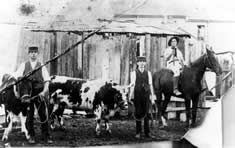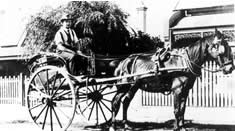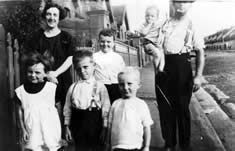
 |
Early years - 'Born on a dairy in Marrickville'
|
|||||||||||||||||||
 |
The Fitzgerald family dairy at Marrickville John Curtin Prime Ministerial Library. Records of the Fitzgerald family. Tom Fitzgerald's Uncle Dave at Marrickville dairy, n.d. JCPML00720/10 |
||||||||||||||||||
Working the milk run introduced Tom to the whole neighbourhood and the area was to have an 'enormous tug' on him throughout his life.
|
|||||||||||||||||||
 |
Tom Fitzgerald's father, Thomas, delivering milk by horse and cart, 1920s John Curtin Prime Ministerial Library. Records of the Fitzgerald family. Tom Fitzgerald's father, Thomas, early 1920s. JCPML00720/12 |
||||||||||||||||||
|
|
|||||||||||||||||||
 |
Tom Fitzgerald, standing back row, with his parents and siblings. John Curtin Prime Ministerial Library. Records of the Fitzgerald family. Tom Fitzgerald and parents and siblings, n.d. JCPML00720/24. |
||||||||||||||||||
|
Footnotes1 - 2 John Curtin Prime Ministerial Library. Records of the National Library of Australia. Interview of Tom Fitzgerald, 01/02/1988 - 3/09/1988. JCPML00658/1. Original held by National Library of Australia TRC 2247
|
|||||||||||||||||||